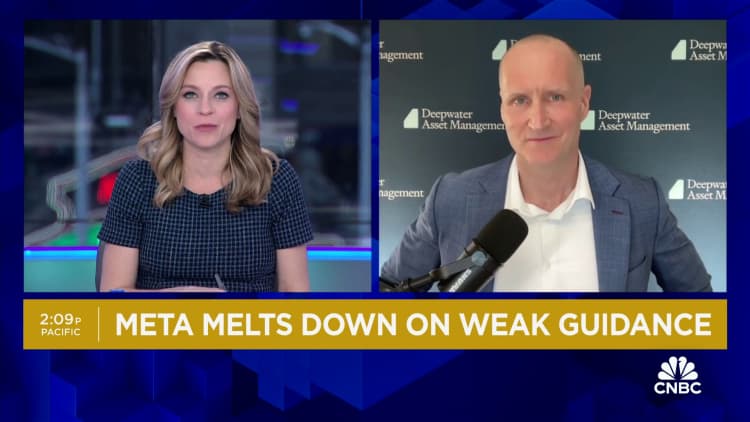Mark
Zuckerberg,
CEO
of
Meta
testifies
before
the
Senate
Judiciary
Committee
at
the
Dirksen
Senate
Office
Building
on
January
31,
2024
in
Washington,
DC.
Alex
Wong
|
Getty
Images
Mark
Zuckerberg started
Meta‘s
earnings
call
by
talking
about
artificial
intelligence.
Then
he
moved
onto
the
metaverse,
touting
his
company’s
headsets,
glasses
and
operating
system.
He
spent
almost
the
entirety
of
his
opening
remarks
focused
on
the
many
ways
Meta
loses
money.
Investors
weren’t
into
it.
Meta
shares
tumbled
as
much
as
19%
in
extended
trading
on
Wednesday,
wiping
out
more
than
$200
billion
in
market
cap.
The
drop
came
despite
Meta
reporting
better-than-expected
profit
and
revenue
for
the
first
quarter.
Zuckerberg
appeared
ready
for
the
sell-off.
“I
think
it’s
worth
calling
that
out,
that
we’ve
historically
seen
a
lot
of
volatility
in
our
stock
during
this
phase
of
our
product
playbook
where
we’re
investing
in
scaling
a
new
product
but
aren’t
yet
monetizing
it,”
Zuckerberg
said.
He
cited
past
efforts
like
short-video
service
Reels,
Stories
and
the
transition
to
mobile.
Meta
generates
98%
of
its
revenue
from
digital
advertising.
But
to
the
extent
Zuckerberg
talked
about
ads,
he
was
looking
to
the
future
and
the
ways
the
company
could
potentially
turn
its
current
investments
into
ad
dollars.
In
discussing
Meta’s
effort
to
build
a
“leading
AI,”
he
said,
“There
are
several
ways
to
build
a
massive
business
here
including
scaling
business
messaging,
introducing
ads
or
paid
content
into
AI
interactions.”
He
spent
time
talking
about
Meta
Llama
3,
the
company’s
newest
large
language
model,
and
the
recent
rollout
of
Meta
AI,
the
company’s
answer
to
OpenAI’s
ChatGPT.
Zuckerberg
then
moved
onto
potential
opportunities
for
expansion
within
the
mixed
reality
headset
market,
like
a
headset
for
work
or
fitness.
Meta
opened
up
access
to
the
operating
system
that
powers
its
Quest
headsets
on
Monday,
which
Zuckerberg
said
will
help
the
mixed
reality
ecosystem
grow
faster.
He
also
talked
up
Meta’s
AR
glasses,
which
he
called
“the
ideal
device
for
an
AI
assistant
because
you
can
let
them
see
what
you
see
and
hear
what
you
hear.”
The
Ray-Ban
Meta
Headliner
smart
glasses.
Jake
Piazza
|
CNBC
In
the
meantime,
Meta’s
Reality
Labs
unit,
which
houses
the
company’s
hardware
and
software
for
development
of
the
nascent
metaverse,
continues
to
bleed
cash.
Reality
Labs
reported
sales
of
$440
million
for
the
first
quarter
and
$3.85
billion
in
losses.
The
division’s
cumulative
losses
since
the
end
of
2020
have
topped
$45
billion.
Zuckerberg
has
bought
himself
some
time.
Meta’s
stock
price
almost
tripled
last
year
and,
as
of
Wednesday’s
close,
was
up
40%
in
2024.
It
reached
a
record
$527.34
in
early
April.
After
a
brutal
2022,
during
which
the
company
lost
about
two-thirds
of
its
value,
Zuckerberg
appears
to
have
regained
the
confidence
of
Wall
Street.
The
driver
for
the
rally
has
been
a
cost-cutting
plan
that
the
Meta
CEO
put
in
place
early
last
year,
when
he
told
investors
that
2023
would
be
the “year
of
efficiency.”
The
company
slashed
headcount
and
eliminated
unnecessary
projects
in
an
effort
to
become
a
“stronger
and
more
nimble
organization.”
Zuckerberg
said
Wednesday
that
Meta
will
continue
to
operate
efficiently,
but
that
shifting
existing
resources
to
investments
in
AI
will
“grow
our
investment
envelope
meaningfully.”
Capital
expenditures
for
2024
are
anticipated
to
be
in
the
$35
billion
to
$40
billion
range,
an
increase
from
a
prior
forecast
of
$30
billion
to
$37
billion
“as
we
continue
to
accelerate
our
infrastructure
investments
to
support
our
artificial
intelligence
(AI)
roadmap,”
Meta
said.
Zuckerberg
said
he
expects
to
see
a
“multiyear
investment
cycle”
before
Meta’s
AI
products
will
scale
into
profitable
services,
but
noted
that
the
company
has
a
“strong
track
record”
in
that
department.
Meta
finance
chief
Susan
Li
echoed
Zuckerberg’s
remarks,
saying
the
company
needs
to
develop
advanced
models
and
scale
products
before
they
will
drive
meaningful
revenue.
“While
there
is
tremendous
long-term
potential,
we’re
just
much
earlier
on
the
return
curve,”
Li
said.
Even
before
the
call
began,
investors
were
trimming
their
holdings.
That’s
because
Meta
issued
a
light
revenue
forecast
for
the
second
quarter,
overshadowing
the
first-quarter
beat.
As
the
stock
plunge
intensified,
Zuckerberg
told
investors
that
if
they’re
willing
to
come
along
for
the
ride,
they
may
well
be
rewarded.
“Historically,
investing
to
build
these
new
scaled
experiences
in
our
apps
has
been
a
very
good
long-term
investment
for
us
and
for
investors
who
stuck
with
us
and
the
initial
signs
are
quite
positive
here
too,”
Zuckerberg
said. “But
building
a
leading
AI
will
also
be
a
larger
undertaking
than
the
other
experiences
we’ve
added
to
our
apps
and
this
is
likely
going
to
take
several
years.”

watch
now
